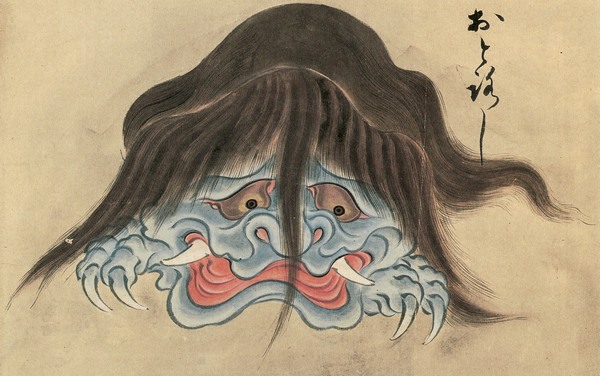Tanuki
Summer wind swinging /
Over a moonlit forest /
Fools in fur at play //
–
Simple eyes see a raccoon /
I see a canine /
Wearing a raccoon’s clothing //
–
Two standing like men /
No longer disguised as men /
Their clever scheme done //
–
Onigiri freshly made /
A man scammed with leaves /
Passed as seven hundred yen //
–
Scrotum expanding /
Flying greatly without wind /
It’s a picnic mat //
–
Merry are the brothers /
Consuming rice and sake //
– – – – – – – – – – – – – – – – – – – – – – – – – – – – – – – – – – – – – – – – – – – – – – – – – – – – – – – – – – – – – – – –
– – – – – – – – – – – – – – – – – – – – – – – – – – – – – – – – – – – – – – – – – – – – – – – – – – – – – – – – – – – – – – – –
Rivaling the kappa in terms of popularity, the tanuki (lit. raccoon dog) is considered a master of shape shifting. If you ever travel Japan, you’re likely to see ceramic statues of this guy all around town. Its name actually can mean two different things; the real animal and the yokai.
The tanuki, despites its looks, is NOT a raccoon, even though it clearly looks like one. It actually belongs to the biological family of Canidae, that which includes dogs, wolves, and foxes. Because of its shape, the tanuki is often mistaken for a badger or raccoon (Disney, sadly, fell into this trap.)
As a yokai, the tanuki is seen as an extremely magical being with shape shifting being its specialty. One Japanese folktale, Bunbuku Chagama, tells of a tanuki that rewards a rescuer a rescuer for its kindness by turning into an old-fashioned teakettle. Tanuki also love pranks, and have been commonly viewed as pranksters and party animals (no pun intended). They can turn leaves and rocks into passable money and are known to drink regularly. But their most distinguishable trait – ready? – is their huge testicles, which contain enormous magical capabilities.
Like Mr. Fantastic, a tanuki’s scrotum can stretch, expand, and morph into anything. ANYTHING. Ancient scrolls depict the tanuki using their balls as weapons, drums, fishing nets, and even using them to make scary faces. Heck, there’s even a children’s rhyme focused on the tanuki’s balls:
Tan Tan Tanuki
no kintama wa,
Kaze mo nai no ni,
Bura bura.
This lovely little poem translates to, “Tan-tan-tanuki’s testicles, even when there is no wind, they swing, swing.” Adorable, isn’t it? Perhaps the most famous portrayal of the testicles’ potentials comes from the Studio Ghibli film Pom Poko (but it loses points for referring to the scrotum as a pouch in the Disney dub).
If you want to see examples of these magical nuts in full color, just type in “tanuki balls” on Google for pictures.
I dare you.
Until next time, see ya!







I never heard of any of this. It’s very interesting and its good you put the extensive descriptions in so people like me who are new to this can understand what you write about. Another good poem.
You learn something new everyday!
Great work. As a long time lover of Tanukis I really enjoyed this.